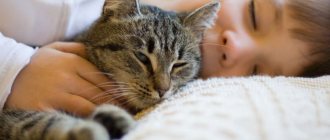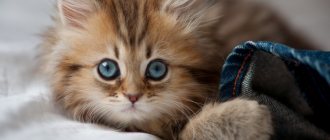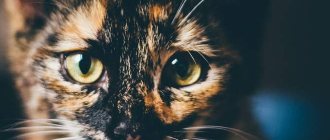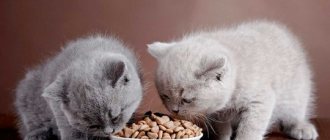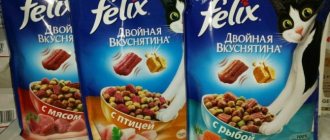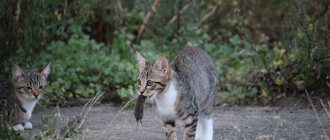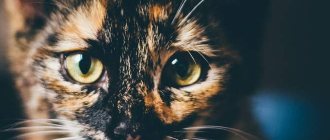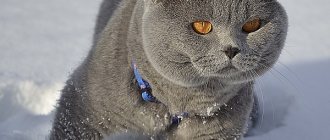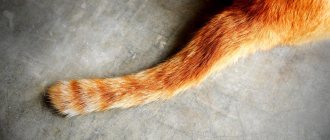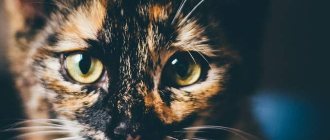Feeding a cat is not a difficult task.
Your pet doesn’t need culinary masterpieces: just make sure you have the correct ratio of proteins, carbohydrates, minerals and vitamins.
But knowing only about the proper nutrition of cats is not enough - it is important to remember which foods are strictly prohibited for cats.
Meat and fish
By nature, cats are carnivores, and meat is their natural food. However, not all meat can be given to your pet:
- Raw meat and fish. It is better to avoid unprocessed meat due to the risk of infecting your cat with worms;
- Offal. Trimmings and intestines are prohibited: feed your cat clean meat. But hearts, kidneys and stomachs are useful, and they should even be given as food;
- Liver. Such food is difficult for the animal to digest. Can be given in small quantities and only boiled;
- River fish. It is dangerous because it contains parasites and provokes urolithiasis.
The opinion that fish is a cat’s favorite food is wrong: in nature, whiskered cats do not fish. Fish is not a natural food for cats, so give it rarely, preferring sea fish. It is recommended to avoid pork: it is a very fatty meat for your pet.
List of not recommended products
Products that are not recommended fall into the category of “possible, but not recommended.” Let's weigh the pros and cons.
Not recommended products:
Milk
Little kittens drink their mother's milk; it contains everything they need for their health and development. With age, lactose is less absorbed by the body - even with a small dose of cow's or goat's milk, a cat may develop diarrhea.
But if the cat does not experience vomiting or diarrhea, milk can be given in small quantities (fat content 2.5% and no more than 10 ml per 1 kg of body).
Canned food
You can give it to your cat, but in small portions, mixing it with oatmeal porridge, for example. Before presenting the animal with a treat, it is advisable to drain the oil from the jar.
Sausages
The opinions of cat owners on sausages are divided: some believe that sausages are unacceptable, while others pamper their pets with delicious sausages and sausages. If the sausage is raw and without lard, you can safely feed it to your cat.
The best thing an owner who loves his pet can do is monitor his reaction to food. Each animal is suitable for different food - what is best absorbed by the body should be given.
Raw meat
Cats are carnivorous animals and they need raw meat, but not all types are suitable. Veterinarians advise avoiding pork and other fatty varieties for feeding: duck and goose, since even a small portion of fatty meat leads to obesity.
Bread products
Pasta, bread and yeast dough. Yeast, entering the body, swells and stretches the animal’s stomach, which causes severe pain. Pasta and baked goods lead to flatulence and colic. But a small piece of whole grain bread won't lead to trouble.
Liver
This product contains toxic amounts of vitamin A, causing poisoning. Raw liver can be contaminated with bacteria (the same goes for raw fish). It would not be surprising if your cat develops diarrhea or a fever after eating. If a cat loves liver, it must be thermally treated.
Eggs
This product is rich in calcium, and its deficiency is dangerous for growing kittens. Sometimes eggs are dangerous for a kitten; it is best to give your baby homemade eggs.
Veterinarians agree that an adult cat can only benefit from quail and chicken eggs, but they should be given to the animal in moderation. Some cats are allergic to protein.
Apples
There will be no harm from the apples; on the contrary, the urine will be acidified and stones will not form. If your cat likes to chew on apples, let him, but you should remove the seeds. You can also give it in small quantities.
Potato
You can give your pet a small piece of boiled potato as a treat, but the product should not be used as part of the diet.
Avocado
Cats may be interested in avocado because it smells like boiled chicken. Avocado is allowed, but in moderate doses (optimal serving: 2 teaspoons).
Expert opinion
Dusheba Vera Ivanovna
In 2010, she graduated from the Moscow State Academy of Veterinary Medicine named after K.I. Scriabin with honors, specializing in veterinary medicine. I regularly attend veterinary conferences, congresses, and webinars.
If the cat initially ate meat, it should continue to be fed. If an animal eats dry food, meat should be a rare guest in the bowl and with additives. Meat is phosphorus, it must be balanced with calcium, otherwise problems with bones will appear. For 100 g of meat you will need 1 tablet of calcide.
Vegetables and fruits
Vitamins from plant foods are also beneficial for cats. But some fruits and vegetables should not be given:
- Potato. Cats cannot digest starch, so potatoes are useless to them;
- Cabbage and legumes. Cause flatulence and bloating;
- Onion and garlic. They have a strong taste and contain substances that are toxic to animals;
- Mushrooms. Food too heavy to digest;
- Avocado. The fruit of this fruit is poisonous to cats;
- Nuts. Do not let your cat play with nuts: they are dangerous due to their high phosphorus content;
- Grapes and raisins. This fruit is poisonous to cats, as it is to dogs.
Cats do not digest fiber, but it is necessary to include vegetation in the menu. You can give carrots, cucumbers, zucchini, spinach, lettuce and boiled beets.
What not to feed a kitten
The nutrition of a small fluffy cat needs to be given more attention than an adult cat, since its digestive system is just developing. Proper nutrition for a kitten is the key to the health and well-being of your beloved pet.
If we talk about the nutrition of kittens, then they should not be given all the foods that are prohibited for adult cats.
The exception is milk.
Babies should not be given cow's milk, as it has too high a fat content - the kitten's stomach will not be able to digest it. If the kitten is still small and needs milk, then purchase goat milk or cat milk substitutes from veterinary stores. It is allowed to give kittens fermented milk products with low and zero fat content.
Fish (river, sea) is not very healthy for kittens - it can only be given boiled and without bones no more than 2-3 times a week. All food from the table is prohibited for both adults and kittens - it contains a lot of spices, salt, and artificial additives. This is not a natural food for babies - there is no need to pamper them with a piece of sausage or sausage.
Industrially produced dry food is allowed for kittens, but if you choose this type of food, remember, you should not give Whiskas. It is necessary to feed high quality food that is formulated for kittens.
Important!
You cannot feed your kitten monotonously, for example, only fish (meat). A monotonous diet will not bring a sufficient amount of micro- and macroelements to the body of a growing animal.
From the master's table
Under no circumstances should you feed your animal table scraps: for animals this food is often useless and dangerous. It is forbidden to give a cat:
- Sausage and frankfurters. Despite popular myth, these foods are harmful to the liver and heart;
- Fatty foods. Fried meat and lard are difficult to digest;
- Floury. You should not feed your pet buns, cookies, pasta: they cause bloating and negatively affect weight;
- Bones and cartilages. They get stuck in the throat. It’s better to buy a special delicacy made from veins;
- Sweets. Sugar causes obesity, diabetes in cats, and worsens the condition of teeth and general appearance;
- Chocolate and cocoa. Cause problems with the heart and blood vessels;
- Coffee, tea, alcohol. Never offer these drinks to your cat.
Remember that a cat has a different, shorter intestine, smaller size and heart. Some foods from the human table can even cause death.
Useful video
What not to feed cats and kittens, advice from a veterinarian.
Get to know interesting cat breeds with the help of our encyclopedia: Havana Brown, Dwelf, Manx.
What grass do cats eat and why?
What to feed a kitten?
Why shouldn't a cat be given milk?
Like all mammals, kittens feed only on milk. And, like almost all mammals, they stop assimilating it with age. Milk can cause an attack of diarrhea in an adult cat. Of course, often cats are fed milk, and there are no external consequences on the floor. However, no one knows how the cat feels inside.
Adult cats cannot have milk, but they can have fermented milk products: kefir, fermented baked milk, yogurt and low-fat sour cream, because nothing fatty at all is allowed.
The importance of proper diet
Due to the nature of their keeping, domestic animals are quite demanding on their diet. Their diet must be balanced to meet the body's nutritional needs. It is especially important that your kitten and aging pet receive a balanced diet, otherwise they may develop health problems. An adult cat should also have a special diet.
When compiling a diet, you need to rely on the following points:
- breed. Each variety has its own food requirements;
- age. At a certain period of its life, an animal needs specific nutrients that are necessary for proper growth and development, as well as maintaining health;
- Finished products (dry and wet food) or natural products are used.
The easiest way to feed your pets is dry food (especially super-premium food). If the animal is offered natural products, it is necessary to alternate them correctly. Also in this case, it is important to know what food can be given and what is strictly prohibited.
Some information about water
It is also necessary to say about water. The excretory system of cats is designed in such a way that urine accumulates quite slowly and becomes more and more concentrated. But this does not mean that the pet can live for a long time without fluid.
Rare water consumption by a cat does not mean that you can save on it
The cat must be provided with access to fresh and clean water. Moreover, its quality needs to be given increased attention. If tap water can be used for cooking without any problems, then it is also suitable for a cat. Otherwise, it is better to give your cat bottled water.
By the way! If your pet has a tendency to drink tap water, it is better to stop him from this hobby. Plaque can accumulate in tap water, which will later settle on the walls of the cat’s stomach.
Read below about the existing types of water and the degree of their usefulness for the cat’s body.
Which water is healthier for a cat?
Alcohol
Human stupidity knows no bounds, especially “caring” owners, without delving too deeply into the topic of what cats and kittens should not eat, strive to give them the most out of life. And then this happens:
We can talk endlessly about the dangers of alcohol for humans, but, in spite of everything, people drank, drink and will drink it, realizing the harm they are doing to themselves. In the case of animals, they do not understand that even a small dose of strong drink can lead to serious consequences, including death.
